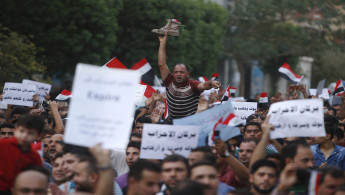Iraq: Abadi's reforms create hundreds of 'ghost officials'
Iraqi Prime Minister Haider al-Abadi's drive for ministerial reform and downsizing will probably do little to help the country cope with its financial crisis.
Although hundreds of senior officials were sacked and a number of ministries were abolished or merged with other ministries, the sacked ministers and officials will apparently continue to receive their salaries and allocations.
Many will even be retained in other capacities in new institutions.
Saad al-Hadithi, a spokesperson for the Office of the Prime Minister, told al-Araby al-Jadeed's Arabic service: "Ministers, senior officials, advisors and others included in the prime minister's decision will continue to be affiliated with the Iraqi state."
Hadithi added: "The officials will keep their salaries and allowances, and will discharge their duties under new titles."
Commenting on this, a political expert who spoke to al-Araby al-Jadeed said that Abadi's decisions downsizing departments and abolishing a number of top posts would end up creating an "army of ghost officials."
The expert pointed out that these superfluous officials, unlike in the past, would not be accountable and would work "behind the scenes" while keeping all their privileges.
The expert said this equated to deception and manipulation of the Iraqi people, who are demanding real reforms.
Meanwhile, economists have told al-Araby al-Jadeed that Abadi's reforms would not bring any savings for the Iraqi government, as there will not be any cuts in the huge salaries and allowances paid to senior officials.
The Iraqi Prime Minister has already started implementing his reform programme whose stated objective is curbing corruption and reducing government waste, which has sparked widespread anger and weeks of protests.
He has so far abolished four ministries and merged eight others.
This is an edited translation from our Arabic edition.





 Follow the Middle East's top stories in English at The New Arab on Google News
Follow the Middle East's top stories in English at The New Arab on Google News


